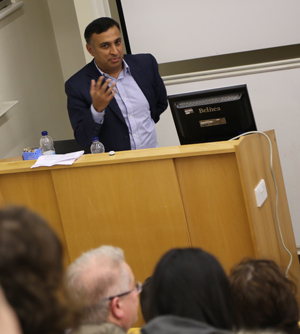When Worlds Embrace: Uniting TV Research and Practice
Posted by Angela Graham

I believe I’m not unusual among tv producers in finding that academic work about television doesn’t exactly fall across my path. I’ve been teaching documentary-making skills in JOMEC so I designed Expertise Exchange – jointly hosted by the RTS and JOMEC – as a contribution towards joint reflection by academics who study TV and TV professionals on TV output in Wales and beyond.
For a producer why is it important to reflect on what has been made? For one’s own sake, as consolidation of things learned; as a way of assessing the influence of the zeitgeist on production choices and, most importantly, as a way of understanding what I’ll call the cultural politics of television – the intersection of one’s own work with the audience and with the audience’s context, that is, the country, the world, to which one broadcasts – and the ‘policy’ politics, that is the legislative and regulatory frameworks within which broadcasting and communication exist and flourish, or not.
If our work as TV professionals is worth doing at all then that’s because we believe it affects the audience. If it doesn’t, then we are wasting our time and theirs. If we are potentially affecting large numbers of people then we ought to care about what those effects are.
Furthermore those who are properly serious about their work care about what it might have to offer to younger generations of professionals, about what can be distilled from experiences in order to contribute to the development of the industry. As time has gone by in my career I’ve realised how important it is to make a considered record of what is produced.
But TV professionals are extremely busy people. One project is not ended before the next is underway. Attending conferences eats up time and money. It’s not easy to justify time spent on reflection and we no longer work exclusively in large corporations but in small units where it’s hard to find a critical mass to assess where we’re going as an industry.
We need academics to help us in this. They have the opportunity to consider topics in depth, to note what we professionals are doing, to hold us to account about claims made and content delivered, to scrutinise what the television industry is doing to the country it serves and/or makes money from.
In turn, academic study of television should connect thoroughly with those who work in television. Otherwise it fails to fulfil itself to the extent that it remains sufficient unto itself.
Pleasingly, Expertise Exchange produced three ongoing projects: Prof Jenny Kitzinger and Erika Hossington on a potential storyline for ‘Casualty’ about people in vegetative states; Dr Ross Garner and Mike Talbot on producing TV for the ‘mainstream’ in Wales and Dr Cindy Carter and BBC Broadcast journalist, Huw Foulkes on news production for young teenagers.
In a spirit of mutual respect and, I stress, not in a spirit of opposing forces clashing, professionals and academics can significantly and critically enhance each others’ work for the mutual benefit of all.
